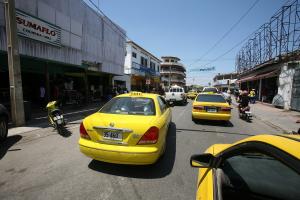Special Envoy Jean Todt is visiting Timor-Leste from 7 until 10 February, to meet H.E President José Manuel Ramos-Horta, ministers and representatives of the public and private sector, and civil society, to advocate for the effective implementation of the Global Plan for the Decade of Action for Road Safety 2021-2030, which aims to halve the number of victims on the road by 2030.
The new World Health Organization (WHO) Global status report on road safety 2023, highlights that 28% of all road traffic fatalities occur in South-East Asia. The region reported 16.1 deaths per 100 000 population due to road traffic crashes, three times higher than the European average of 5/100,000 (WHO 2023).
According to the new report, the mortality rate in Timor-Leste is 12 per 100,000 inhabitants (WHO 2023). The country saw a 25% decline in fatalities since 2018 (WHO 2023), but road crashes still represent one of the main cause of fatalities in the country, especially among the young generations and men (WHO 2019).
“Despite progress in the region, road crashes remain the main killers of children worldwide, so it is time to act to protect the most vulnerable on the road. Going to Timor-Leste, my role, as UN Secretary-General's Special Envoy for Road Safety, is to support President José Manuel Ramos-Horta, his government, and stakeholders in their work to build safer and sustainable roads for all,” highlights the Special Envoy.
Road crashes are a public health issue…
In Timor-Leste, there are still important areas to work on to improve road safety, such as limiting the speed to 30 km/h in urban areas or around schools, offering the population safe alternatives to motorized vehicles, or promoting the use of helmets in line with the minimum UN safety standards, which can reduce the risk of brain injury in case of crash by up to 74%. Timor-Leste is also highly vulnerable to natural hazards, which damage an already strained road infrastructure. In addition, the last full traffic survey in the country dates back 10 years, making precise planning difficult due to the lack of accurate data.
… and an economic and development issue
Poor road safety conditions affect the world's poorest the most, especially women and youth, and deprive them of access to education, work, health, basic and cultural services. With that in mind, the UN system supported the Government of Timor-Leste in renovating approximately 320 km of rural roads in 2021 (UN Timor-Leste 2022 Annual Report). This renovation provided economic opportunities, access to markets, and social services to more than 17,000 individuals living in rural areas.
In addition to the human tragedy, road crashes trap countries into a vicious circle of poverty. Some estimates place the global macroeconomic cost of road traffic injuries as high as USD 1.8 trillion (WHO 2023). According to the World Bank, the cost of road crashes represents 4.4 % of GDP (WB 2016) in Timor-Leste.


